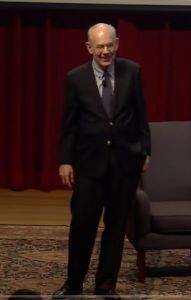Acesse a sua conta getAbstract para obter o resumo!

Acesse a sua conta getAbstract para obter o resumo!
John J. Mearsheimer
The Great Delusion with Professor John Mearsheimer
The Bush School of Government & Public Service, 2018
Sobre o que é?
An eminent political scientist says America’s pursuit of liberal hegemony has made the world less safe.
Recommendation
The United States has pursued a series of costly and ineffective wars since the 1990s and now finds itself at a foreign policy and domestic political crossroads. How did it get to this point? Political theorist and professor John Mearsheimer blames America’s predicament on its pursuit of liberal hegemony after the end of the Cold War. In this thought-provoking video, his “offensive realist” take on geopolitics sets aside partisan labels in favor of the defining identities of liberalism and nationalism, and he outlines how those worldviews play out on the world stage.
Summary
About the Speaker
John Mearsheimer is a professor of political science at the University of Chicago.

















Comment on this summary